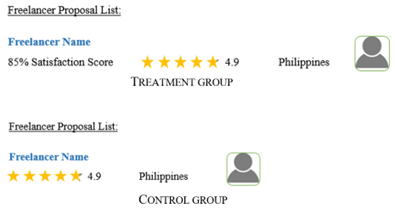How building trust in online platforms can help users but may harm intermediaries
This blog is written by Grace Gu and Feng Zhu
Intermediaries are everywhere in our economy: brokers in the finance and insurance industries, headhunters in the labor market, distributors in retail, housing agents in real estate, and online platforms in the information technology industry, just to name a few. In 2010, intermediaries contributed an estimated 34% of the US gross domestic product.[1] However, all intermediaries face the risk of disintermediation, in which two sides circumvent the intermediary to transact directly and avoid the intermediary’s fees.

Disintermediation, wherein network members bypass a hub and connect directly, can be a big problem for any platform that captures value directly from matching or by facilitating transactions. Imagine that you hire a plumber from a platform like Homejoy and are satisfied with the service. Would you really go back to Homejoy to hire the same plumber again? After a consumer is matched with a service provider, there’s little incentive to return to the platform. Additionally, after obtaining enough clients from a platform to fill his or her schedule, the service provider won’t need that platform anymore. This was exactly the problem that doomed Homejoy, which shut down in 2015, five years after it was founded.
Examples like this are not hard to find. For instance, the traditional role of book publishers as intermediaries was weakened when Amazon enabled authors to sell directly to readers through its self-publishing services. Li & Fung, a supply-chain management company that connects global retail brands with Chinese manufacturers, suffered ongoing decline in revenue as retailers disintermediated to work with manufacturers directly. A survey by ZBJ.com, the largest online freelance marketplace in China, indicates that approximately 90% of transactions are conducted outside the platform after clients and freelancers have been matched on its platform. Hotels and airlines offer incentives to lure customers to book directly with them, thereby shrinking the revenue for online travel agencies.
How to address the issue of disintermediation? Because of the importance of disintermediation with regard to firms’ strategies and survival, platforms have used various mechanisms to deter disintermediation. Some platforms try to avoid disintermediation by enhancing the value of conducting business on them. But those services become less valuable once trust develops among platform users—and these strategies can backfire as the need for the platform decreases. This is what our study investigates.
In our recent study published in Management Science, we are curious to learn how user trust affects disintermediation, leveraging a randomized control trial (RCT) in a large online outsourcing platform. This platform enables clients to find freelancers who satisfy the clients’ job requirements to initiate and complete job contracts, and the platform charges a per-transaction service fee that is approximately 10% of each transaction’s value. In an RCT in 2015 which lasted for four weeks, the platform provider shows freelancers’ satisfaction scores (SSs) to a random sample of clients, illustrated in the Figure below. SSs are a newly developed measure of a freelancer’s business reputation based on his or her complete work history on the platform.

Our analysis of the above RCT generates interesting findings: As the platform improved its reputation-rating system, trust between clients and freelancers grew stronger, and disintermediation became more frequent, offsetting the revenue gains from better matching. We also identify other contributing factors to disintermediation tendencies, like being geographically near one another, having easily divisible jobs, and clients themselves having high ratings.
To platform managers, our findings highlight that disintermediation can sometimes render less effective an intermediary’s strategy to improve its profitability through enhancing trust. It is important to note that the main objective of our research is not to conduct a net benefit analysis to determine whether it is optimal for platforms to implement better reputation systems. Rather, because trust building is important for platform growth, it is of vital importance for a platform to build as much trust as possible. At the same time, our research suggests that as a platform builds more trust to facilitate transactions in its marketplace, it needs to adopt appropriate strategies to counter increased disintermediation.
Platforms could use a variety of strategies to reduce disintermediation as they enhance trust. Airbnb, for example, enhances trust and safety through host ID verification and background checks. At the same time, Airbnb reduces disintermediation by withholding host data, such as listing address or phone number, until the payment is made. Thumbtack, a marketplace that connects consumers with local service providers such as house cleaners, captures value pre-transaction: when customers post job requests on Thumbtack, service providers can send quotes to the customers; service providers pay fees to Thumbtack only if customers respond. Disintermediation affects Thumbtack less strongly because its model captures value before two parties agree to work together.
Other platforms recognize that the motivation to disintermediate comes from the service fees they charge and adopt different value-capture strategies to prevent disintermediation while still enhancing trust. For example, Chinese outsourcing marketplace ZBJ, which launched in 2006 with a 20% commission model, began pursuing other revenue sources after calculating that it could lose as much as 90% of its business to disintermediation. In 2014, ZBJ leveraged big data analytics to find that new business owners often used ZBJ to outsource logo design. However, after logo design, many of these clients would also need business and trademark registration. Thus, ZBJ began offering this service and has now become the largest provider of trademark registration in China. Replicating this experience, ZBJ began providing several other services to its marketplace participants. With these revenue streams, the company decided to significantly reduce its commission to 2% and shifted its resources from fighting disintermediation to growing its user base and building trust (for example, by encouraging clients and freelancers to communicate). Because of these changes, the company obtained a valuation over $1.5 billion in 2018.
Platform managers may use our study as a starting point to come up with more creative strategies to mitigate the tension between trust building and disintermediation. We hope that our study inspires a growing stream of academic research as well as managerial best practices to prevent disintermediation and enhance platform value capture.
This blog is based on Grace and Feng’s research published in Management Science, which is included in the platformpapers references dashboard:
Gu, G., & Zhu, F. (2021). Trust and disintermediation: Evidence from an online freelance marketplace. Management Science, 67(2), 794-807.
[1] Spulber, Daniel F. 2011. “Should Business Method Inventions be Patentable?” Journal of Legal Analysis, 3(1): 265–340.